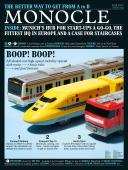
Issue 104
Munich’s hub for start-ups a go-go, the fittest HQ in Europe and a case for the staircases.
In This Issue
Oops! No content was found.
Looks like we no longer have content for the page you're on. Perhaps try a search?
Return Home
Click here to discover more from Monocle

Munich’s hub for start-ups a go-go, the fittest HQ in Europe and a case for the staircases.
Looks like we no longer have content for the page you're on. Perhaps try a search?
Return Home